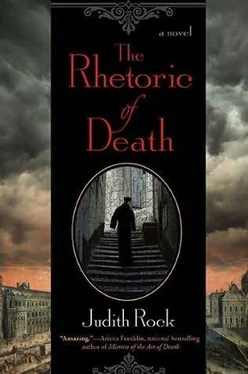Judith Rock - The Rhetoric of Death
Здесь есть возможность читать онлайн «Judith Rock - The Rhetoric of Death» весь текст электронной книги совершенно бесплатно (целиком полную версию без сокращений). В некоторых случаях можно слушать аудио, скачать через торрент в формате fb2 и присутствует краткое содержание. Жанр: Исторический детектив, на английском языке. Описание произведения, (предисловие) а так же отзывы посетителей доступны на портале библиотеки ЛибКат.
- Название:The Rhetoric of Death
- Автор:
- Жанр:
- Год:неизвестен
- ISBN:нет данных
- Рейтинг книги:3 / 5. Голосов: 1
-
Избранное:Добавить в избранное
- Отзывы:
-
Ваша оценка:
- 60
- 1
- 2
- 3
- 4
- 5
The Rhetoric of Death: краткое содержание, описание и аннотация
Предлагаем к чтению аннотацию, описание, краткое содержание или предисловие (зависит от того, что написал сам автор книги «The Rhetoric of Death»). Если вы не нашли необходимую информацию о книге — напишите в комментариях, мы постараемся отыскать её.
The Rhetoric of Death — читать онлайн бесплатно полную книгу (весь текст) целиком
Ниже представлен текст книги, разбитый по страницам. Система сохранения места последней прочитанной страницы, позволяет с удобством читать онлайн бесплатно книгу «The Rhetoric of Death», без необходимости каждый раз заново искать на чём Вы остановились. Поставьте закладку, и сможете в любой момент перейти на страницу, на которой закончили чтение.
Интервал:
Закладка:
Bewildered, Charles tasted the wine, which was indeed better than usual.
“Maitre du Luc, this afternoon I was very angry. And perhaps it will turn out that you must leave the Society.” He lifted his shoulders slightly. “And what I am about to say may mean that I will be on your heels. But I am not telling you to leave, and my own superior is not here to tell me to leave. St. Ignatius said that his men must not obey any ill order. I do not believe that I gave you an ill order in telling you to leave the murder and the accident alone. But I am not God. Perhaps your conscience sees farther, by God’s grace, than I can. Obedience, ultimately, is to God’s will. Mediated, we believe, through the ordered ranks of our superiors. But any man, no matter how exalted, may be wrong.” He drained his glass and filled it again. “If you obey the order I am about to give you, I suspect that you will find more than sufficient penance for whatever was not of God in your failure to obey me so far. What human action, after all, is completely free of sin? My order is this: Find Philippe’s killer, and find the man who attacked Antoine. If they are two different men.”
Charles stared at Le Picart like the Israelites might have stared at the dry path opening before them as the Red Sea drew back.
“What is your answer, Maitre du Luc?”
Flinching at the unwitting echo of La Reynie’s words earlier that day in the Louvre, Charles said, “My answer is yes, mon pere. I will gladly obey your order.” This time he meant it.
“Then you are excused from your morning class, though not from your duties surrounding the ballet and tragedy. Those must be carried out absolutely, no matter what else happens.” He looked at Charles over the rim of his glass. “Always excepting, of course, your own demise.”
“Which would be very thorough penance,” Charles returned dryly.
“It would. In the meantime, you have my permission to come and go from the college, alone and at will. If anyone challenges that, refer him to me. You will report to me and you will tell no one else what you are doing. And when this is over, you will make a thirty-day retreat during which you will examine yourself very seriously with regard to the vow of obedience and your future as a Jesuit.”
Charles bowed his head. “Yes, mon pere.”
Le Picart suppressed a yawn. “We both want our beds. But first, I must hear all you know and suspect. Did Antoine really receive a note from Philippe?”
Charles drank down half his wine in an effort to pull himself together. “I think he is telling the truth about the note. It explains his being out in the street. But when I asked him if he recognized Philippe’s writing, he said the writing was ‘wobbly.’ I think someone wrote the note after Philippe was already dead, to lure Antoine into the street for the ‘accident.’ ”
“But you could be wrong about whoever ran from you wearing the yellow shirt. It could have been Philippe. He could have come back and left the note.”
“But why ask an eight-year-old for help? Wouldn’t Philippe more likely turn to someone at least his own age-his cousin Jacques, perhaps?”
“Unless he was asking for something only Antoine would know or could do. Though I admit, it is hard to think what that might be.”
“And there is also the question of why Philippe left the classroom in the first place, mon pere. He watched the windows that day, to the exclusion of nearly everything else. I think he was waiting for a signal to go and meet someone. And when it came, I think he went directly to his death.” Charles leaned forward in his chair. “Antoine told me more about what he saw between Pere Guise and Mme Doute. Philippe didn’t witness the kiss, but Antoine told him about it, and Philippe was angry. Antoine is too young to understand what he saw, but Philippe would have understood it all too well, especially since the woman was apparently trying to entice him, too. Hearing that Pere Guise welcomed her advances might have been the last straw for Philippe-I think he would have been outraged on his father’s behalf. What if he taxed Pere Guise with it, and Pere Guise killed him in fear of exposure?”
“No, no, after you and Antoine left, Pere Guise told me what lay behind Antoine’s accusation. He apologized for striking him, but what the child said embarrassed him so deeply, he lost control of himself. It seems that, a year or more ago, before she was married, Lisette Doute developed an unfortunate passion for him. He was her confessor while she was at court and, well, as I am sure you know, these things do happen with young girls. He admitted that that was why he’d introduced her to M. Doute in the first place. He thought marriage had solved the problem, but then she threw herself at him that day in the garden. He had no idea Antoine was there.”
“As Antoine tells it, Pere Guise did his share of the throwing.”
“How long have you been in the Society, maitre?”
“Seven years, mon pere.”
“Long enough, then, to know that God does not conveniently remove the sexual organs at first or even final vows. An oversight on His part, one is often tempted to think, but there it is.”
“Remove them?” Charles involuntarily recrossed his legs. “I wouldn’t go that far, mon pere. After all, even St. Augustine prayed that the gift of chastity might be delayed.”
The rector’s gaze was uncomfortably speculative. “But he did pray for the gift. Pere Guise would not be the first priest to have mixed feelings over the attentions of a pretty girl. That is between him and his own confessor. No, Maitre du Luc, the situation with the girl is a small thing. As for Philippe’s anger at Pere Guise, people are constantly angry at him.” He sighed. “I often am, myself. And even if we entertain your theory, it immediately becomes impossible. Pere Guise says he was with his aunt the Duchesse when Philippe disappeared, and the brother who was keeping the door that day confirms that Pere Guise left by the postern immediately after dinner and was gone all afternoon.”
“But the old stairs make the doorkeeper’s statement meaningless. Pere Guise could have returned to the college and left again unseen. Strangling doesn’t take long, mon pere.”
The rector’s eyebrows lifted. “I will not ask how you know that-I am beginning to suspect that you learned much as a soldier that I have no wish to know. Yes, Pere Guise could have used those stairs, but so could any one of us. You will not be of use to me-or to the truth-if you let your dislike of the man blind you.”
Charles bowed his head in acknowledgment. “Forgive me, mon pere.”
“I wish we had blocked that staircase when we took back the rooms above the bakery,” Le Picart said, “but there was no money. No one is supposed to have the key to the doors but myself and the head proctor.”
Charles looked up, his gaze sharpening. “The head proctor?”
“Frere Chevalier is seventy-three, the soul of honor, and too arthritic to climb stairs.”
“But could Pere Guise-or someone else-have taken his key and copied it?”
Le Picart frowned. “Frere Chevalier doesn’t see as well as he used to. I will ask him, but-could anyone really come and go through the bakery without being spotted? Or heard?”
“I did.” Charles drained his glass. “The door hinges have been greased. You have only to watch your moment, when the LeClercs are in the back of the shop, and then be quick. I think it could be done even at night, if you had a key to the bakery door. And I would wager that Pere Guise has one. The baker is deaf, his wife says. Though she certainly is not! Mon pere, even without the Mme Doute complication, we come back again and again to Pere Guise. He searches for the note, the hidden stairs lead to his rooms, he is close to the Doute family, he-”
Читать дальшеИнтервал:
Закладка:
Похожие книги на «The Rhetoric of Death»
Представляем Вашему вниманию похожие книги на «The Rhetoric of Death» списком для выбора. Мы отобрали схожую по названию и смыслу литературу в надежде предоставить читателям больше вариантов отыскать новые, интересные, ещё непрочитанные произведения.
Обсуждение, отзывы о книге «The Rhetoric of Death» и просто собственные мнения читателей. Оставьте ваши комментарии, напишите, что Вы думаете о произведении, его смысле или главных героях. Укажите что конкретно понравилось, а что нет, и почему Вы так считаете.












